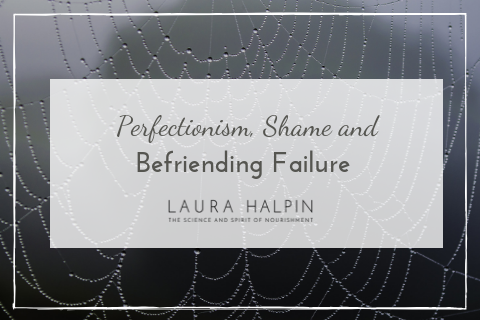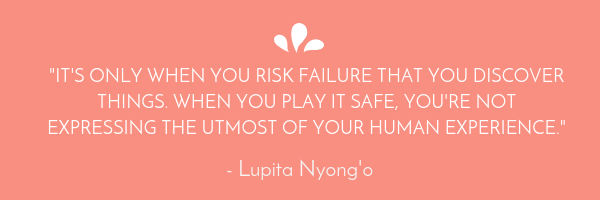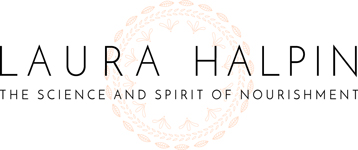
Befriending Failure
I came across an interesting idea the other day. It was an Instagram 30-Day challenge that required participants to itemize at least three ways they failed every day for 30 days. I was completely intrigued. If you're like most people (and if you're like me), you don't need any help focusing on failure. Because perfectionism is a thing, many of us both hyper-focus on our perceived failures and at the same time try to avoid it like the plague.
As an antidote to perfectionism, I've always tried (and encouraged my clients and kids and friends) to focus on successes, no matter how small. It is a valuable skill to identify our successes. Absolutely.
But tracking successes doesn't necessarily address our relationship with failure. The problem isn't so much with failure, but with what it means to us and what we think it means about us.
Brene Brown, in her book The Gifts of Imperfection, writes that when we don't believe that we have worth, we "hustle" for it, and consequently attach our imperfect skills or behaviors to our value. This hustle is a no-win game that results in shame, "an intensely painful feeling or experience of believing that we are flawed and therefore unworthy of love and belonging" (p 38).
So back to the 30-day Failure Challenge. The purpose of it was two-fold: 1) To hold failure as a neutral experience. In other words, to separate failure from self-worth; and 2) to become accustomed enough with failure that it ceased to be something to avoid. (What I found endearing is the person who designed the challenge didn't follow through for the 30 days.)
As I was thinking about failure and my relationship with it, I ran across this guy, Caleb Meakins, who did a very public experiment with his fear of failure. For 40 days, he welcomed challenges from followers that made him face his fear of rejection. You have to check it out. The experiment changed his life.
Have you heard of exposure therapy? It's a type of behavior therapy that is used to treat various anxiety disorders, including phobias and OCD. It involves exposing the patient to the source of anxiety in small, controlled doses. The idea is that with repeated exposure, the patient becomes habituated (or a reduced stress response) to the stimulus.
I propose to any of you perfectionists out there (or any of you who love perfectionists), that we do a little exposure therapy with failure.
Let's play a little.
What befriending failure might look like:
- Have a nightly dinnertime conversation with your family about the ways you fell short of your own (or someone else's) expectations that day. End every share with "and I'm still fucking awesome" (or something more age-appropriate).
- Do something you know you're not going to be good at and allow for the feelings of discomfort and judgment it brings up as you do it. Suggestions include:
- Tell a joke.
- Speak in public in front of a group of people.
- Tell the truth in a situation where you've swallowed it.
- Give someone a compliment.
- Stand up for someone.
- Stand up for yourself.
- Reach out to someone you admire and ask out for coffee.
- Say "no" to someone asking a favor of you.
- Talk to a stranger.
- Ask someone for help.
- Take responsibility for your own hurtful words or actions.
- Take an art class.
- Dance in public.
- Do karaoke.
- Say you're sorry to someone you've wronged.
- Ask for a promotion.
- Wear something outrageous.
- Set a boundary.
- Don't explain yourself when you feel compelled to.
- Participate in a difficult conversation.
- Try hard.
- Audition for something.
- Say something complimentary about yourself in public.
- Come out as the person you really are.
- Think of a quality you don't like about yourself and just make room for it in your mind rather than trying to make it go away. (Hint: the quality you keep encountering in other people that drives you crazy? Start there. It's in you, too.)
- Next time you make a mistake, audibly comfort yourself, and say, "I won't give up on you."
- Any other ideas? I'd so love to hear them.
In Brown's book Rising Strong, Brown quotes author Sarah Lewis: "the word failure is imperfect. Once we begin to transform it, it ceases to be that way any longer...once we are ready to talk about it, we often call the event something else — a learning experience, a trial a reinvention — no longer the static concept of failure."
The thing is that no child, family, relationship, classroom, business or team will ever be safe to fail (and thus free to growth, develop resilience and creativity) unless we befriend failure ourselves. We can't be perfectionists and raise kids who are comfortable with being human. Not gonna happen.
Author adrienne maree brown writes "...systemic change begins in small, inner and interpersonal relationships and actions. The world needs massive, systemic change if we are going to survive. We know this. And a change that massive is only possible if we bring that change into our relationships."
Healing the world begins with you and me. And we cannot heal and be perfect at the same time. It's going to be messy.
So let's get out there and fall flat on our faces. Fail big and fail often. It's pressing.
Love you all,





